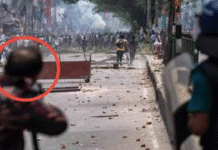Road Transport Act Execution: Mobile court not fully equipped
Overloading, vehicle modification excluded from mobile court jobs
Mobile courts run by the BRTA and district administrations are getting the power to enforce the much-anticipated Road Transport Act 2018 next week. But the courts will not have the full force of the law behind them.
The act’s two key sections that deal with checking unauthorised modifications made to vehicles and overloading are not incorporated in the schedule of Mobile Court Act, 2009, said ministry and Bangladesh Road Transport Authority officials.
As a result, the mobile courts will not check modification and overloading, let alone file cases accusing the violators. This will make the courts less effective.
Unauthorised modification and overloading have been identified by experts as the main causes of frequent crashes and damages to roads and bridges.
Although the act was supposed to come into effect on November 1, Road Transport and Bridges Minister Obaidul Quader halted its full execution, saying that people lacked awareness about the tough law.
But experts pointed out that the BRTA and police had little preparation to enforce the law. The government didn’t even finish framing the rules for the act.
There are also allegations that transport associations had been lobbying against enforcement of the act, which replaced the Motor Vehicle Ordinance, 1983. Officials refute the allegations.
Amid widespread demonstrations for safer roads, parliament passed the act in September last year.
On October 22, the Road Transport and Highways Division issued a gazette stating that the law would come into effect on November 1.
In the first week of this month, the Road Transport and Highway Division sent the law to the home ministry to incorporate it into the schedule of the Mobile Court Act, 2009.
When the home ministry sent the act to the law ministry for vetting, the latter refused to incorporate the section-84 and -98 into the schedule of Mobile Court Act.
Nazrul Islam, secretary of the highway division, said the law ministry made the decision as the highest punishment under these two sections is three years in prison while the mobile court can give a maximum of two years sentence.
For unauthorised modification and overloading offences, police will have to file case and investigate and the court will hold trial.
“This is a time-consuming process,” Nazrul told The Daily Star. “We sent a letter to the law ministry [via home ministry] seeking review of the decision but the law ministry was not persuaded.”
He added that the offences are major concern for the authorities.
He hoped that the necessary gazette would be issued and the mobile court will be able to start working from Sunday. However, the gazette was not issued until yesterday evening, a ministry official said.
Under the section-84, an offender may face a maximum of three years or a minimum of one year in prison or be fined Tk 3 lakh or both if they change the technical specification and structure of a vehicle without approval.
Section-98 says if anybody causes damage to life or property by reckless and risky overtaking, overloading, reckless driving, they would face a maximum of three years in jail or a fine of Tk 3 lakh or both.
Although the law ministry officials said that prison sentence of over two years was beyond the purview of a mobile court, there are many exceptions.
Two officials of the Road Transport and Bridges Ministry and BRTA said over 100 sections of different laws with more than two years’ jail terms have been incorporated in the schedule of Mobile Court Act and mobile courts have been conducting drives to execute those sections for years.
“We have mentioned these issues, but the law ministry was not convinced,” the ministry official said.
Some of the acts they mentioned are Protection and Conservation of Fish Act, Public Examinations Offences (amendment) Act, and Safe Food Act.
A BRTA executive magistrate said the mobile court will give a maximum of two years’ sentence and when the court deems the punishment inadequate, the matter will be referred for filing a regular case.
Contacted, Naren Das, secretary of Legislative and Parliamentary Affairs Division, refused to comment on the issue.
The Daily Star could not reach Law Minister Anisul Huq over phone.
Supreme Court lawyer Jyotirmoy Barua, however, said the law ministry’s decision to keep the sections out of the Mobile Court’s purview was right.
“If any sections with more than two years’ sentence have been incorporated in the schedule of the Mobile Court Act, those were done illegally. One illegal decision can’t justify another illegal action.”
He said a case regarding the Mobile Court Act is still pending with the Appellate Division of the SC.
Jyotirmoy, also a vice-chairman of the Road Safety Foundation, said the authorities have kept many contradictory provisions in the Road Transport Act to provide the transport owners and workers with some undue advantage.
“These would ultimately jeopardise the purpose of the law.”
PROBLEM WITH OVERLOADING AND MODIFICATION
Experts and Roads and Highways Department officials consider a major cause behind early damages to roads and bridges.
This increases maintenance cost of roads and bridges, they said.
Around 25 percent of the country’s roads, constructed by the RHD, are in “poor, bad or very bad” shape, according to a survey on 17,452km of roads in March.
There are 21,576km of national and regional highways and district roads under the department.
There are only three weighbridges in two national highways and the government will build 21 axle load control centres for Tk 1,630.28 crore at the entrance points on the highways within June 2022.
But many owners modify the vehicles, especially trucks, to increase the load capacity. Owners of people carriers also modify their vehicles for similar reasons.
These modifications make the vehicles prone to crashes, said Kazi Shifun Newaz, associate professor of Buet.









